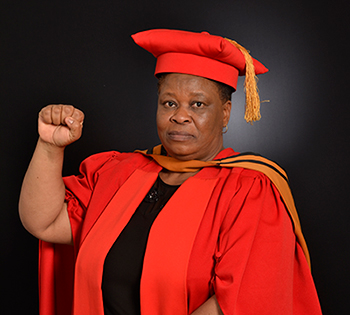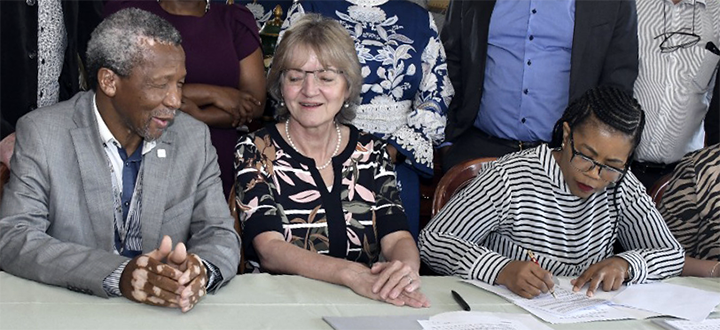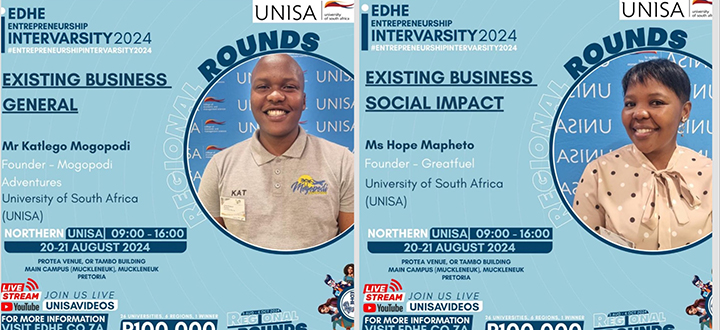News & Media
The curious paradoxes of knowledge and power
 The inaugural lecture of Prof Luyanda Dube, Department of Information Sciences, titled The curious paradoxes of knowledge and power, took place on 15 August 2017.
The inaugural lecture of Prof Luyanda Dube, Department of Information Sciences, titled The curious paradoxes of knowledge and power, took place on 15 August 2017.
In the knowledge age, the saying knowledge is power means to Dube that knowledge is more powerful than physical strength. She is of the view that for people to be effective and efficient, they need to work smart, using knowledge as a critical resource to develop and work productively, in collaboration with others.
With this in mind, she made assumptions that the more knowledge a person gains, the more powerful they become. She said that within a social context, the more knowledgeable individuals become, the stronger their relations should be towards developing a collective intelligence linked to increased power relations. She said knowledge should not only be used as a support for economic productivity but it should play an important role in the legitimation of social and political decisions.
Dube questioned whether the knowledge-power relation was paradoxical, stating that she could not get a definitive answer when she asked herself whether knowledge is power or whether power is knowledge. “What is the power of knowledge? And when is knowledge power? What counts as legitimate knowledge and whose knowledge is worthy? Whose knowledge matters and who decides the legitimacy of knowledge?” She said her lecture intended to highlight the curious paradoxes between knowledge and power, because the complexity of the relationship renders the adage of knowledge is power.
In her perspective on the colonisation of knowledge, colonisers did not acknowledge the uniqueness of Africa and its people, and used their colonial power as a tool towards building their own powerful dominance, leaving an unequal relationship between them and indigenous people of the colonies. Consequently, that oppressive relationship yielded psychological effects to the oppressed as internalised oppression, characterised by hostility, apathy inferiorisation, alienation, depression, doubt and devalue of self-culture, individual and community divisiveness.
Dube brought in another twist in the paradox by questioning why years after the colonial rule ended, Africa is still facing challenges of abject poverty, inequality, under-development, dependence, and economic and political distress. “Why are we still hamstrung and stymied from controlling our social, economic and political agendas? Is there a curse as some have alluded, that totalitarian rule and influence remains a yoke that we cannot control or discard? Why are we inflicting almost the same abuse to ourselves? The answers to the above questions may be difficult to answer because of the number of variables impacting on our understanding of knowledge, power and the ability of individuals or groups to manipulate it.”
In conclusion, she proposed a solution best suited for Africa, which is decolonising knowledge and changing the narrative through the epistemic revolution. She believes that Africans should challenge and redefine embedded domination, exploitation, dependence, and subjugation towards enabling Africans to realise their true potential and take their rightful place in the global innovation arena.
*By Katlego Pilane
Publish date: 2018-02-15 00:00:00.0


 Experimental farm takes Unisa’s agricultural research and training to the next level
Experimental farm takes Unisa’s agricultural research and training to the next level
 Promoting an inclusive education at all levels
Promoting an inclusive education at all levels
 Cream of the crop – Unisa scientists ranked among the world's top 2%
Cream of the crop – Unisa scientists ranked among the world's top 2%
 Nonkululeko Malomane flies the Unisa flag at FameLab final
Nonkululeko Malomane flies the Unisa flag at FameLab final
 Unisa students claim victory in EDHE Intervarsity Competition
Unisa students claim victory in EDHE Intervarsity Competition
